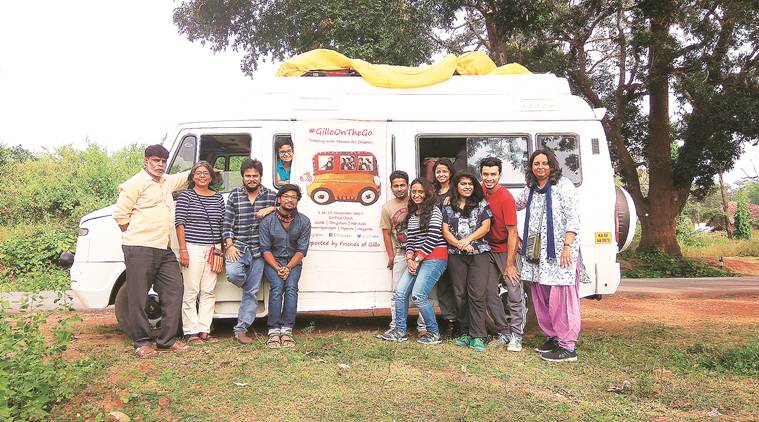
There is no riddle so twisted nor a mystery big enough to confound ace detective Captain Coconut. When he takes it upon himself to crack the case of the missing bananas, Captain Coconut finds himself “on a slippery trail of peels and numbers”. Has the detective bitten off more than he can chew? Theatre director Shaili Sathyu takes young audiences on a plantain path with Captain Coconut in her adaptation of Anushka Ravishankar and Priya Sundram’s book, Captain Coconut and the Case of the Missing Bananas.
The production, meant for six to 12-year-olds, is a part of Mumbai-based theatre group Gillo’s initiative to present plays to children who rarely go to auditoriums. “Most of us live in Mumbai and interact with an urban audience. We wanted to take theatre out to children who don’t have access to it. Children are deprived of entertainment that is made for them. Even in a city, there are few plays that are made for children,” says Abir Patwardhan, a Pune-based theatre practitioner and founder-member of Gillo.
They have scheduled a 15-day tour of Maharashtra this month and a 21-day tour of Karnataka in January-February 2020. Their performance space will be government schools, NGOs and city-schools on their route.
Gillo’s road trip with theatre began with their attempts to “reach out to a wider audience as well as make shows more inclusive”. In 2012, the group started an initiative called ‘Making Theatre Accessible’, which invited children from underprivileged backgrounds to theatre. The efforts to travel to children in rural and semi-urban areas started in 2017, when Gillo undertook a road trip by bus across Karnataka. In 2018-19, they travelled to Maharashtra and Karnataka. “The format that we follow is to stay with theatre companies or school with whom we have worked before and, then, perform in schools around the area. This Hub and Spoke Method enables us to have one base camp and make trips outside to as many schools as possible. We feel that theatre is an integral part of growing up as it can make children more creative, observant and enterprising. This is why we try to stretch theatre to include as many children as possible,” says Patwardhan.
The trips also expose the performers to ground realities in non-urban areas and how children think. At one school, they performed a play called Catch that Crocodile, about a crocodile that comes into a village and results in a hue and cry until a fisherwoman lures it out with fish. “The children had grown up with stories where animals talk. They asked us why the crocodile does not speak throughout our performance? This is not what an urban child is likely to ask. We had based the story on a book and we did not think it was important that the crocodile does not talk. The children’s questions showed us that, in certain cultures and backgrounds, even the things that don’t talk, have a voice,” says Patwardhan, adding that a performance is followed by exchanges with the children.
Theatre performers say that children make honest audiences who are impatient with shows that are less than gripping. Gillo’s package of plays is designed to keep curiosity and energies high. Story Quilt is a multilingual piece made up of three solos, and aimed at audiences of six to 12.
“Each story is brought alive using a different form of storytelling-theatre. The performers use techniques ranging from material theatre to musical theatre to physical theatre and good old fashioned oral storytelling. Stories by a range of Indian authors are curated as a part of this performance,” reads the curatorial note.
The third piece for this year’s Gillo tour is a capsule of two short plays — Kal Bhaat Aayega, in Hindi, and Joker, in Marathi. The former revolves around the friendship between a little boy and a post box. Based on on the theme of freedom, it shows how difficult it is to break out of the shackles, unless you have someone who believes in you. Joker highlights the experiences of three children, who are caught in challenging situations and have to make choices that change their lives. It showcases the importance of trust and friendship, as well as safe spaces for conversation and sharing feelings. “With children, the performance has to be engaging through content or some other element. The more open you are with your storyline, children tend to fill in the blanks better than adults do. Children’s plays are intellectual in a different way from adults’,” says Patwardhan.